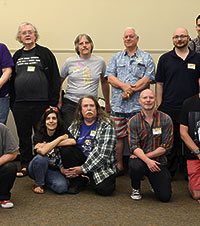Spotlight On: Rachel Swirsky, Writer
Rachel Swirsky’s short fiction has appeared in numerous magazines and anthologies; been collected in Year’s Best anthologies from Dozois, Horton, Strahan, and the VanderMeers; won a Nebula Award; and been nominated for the Hugo, the Locus, and the Sturgeon Memorial awards. Her first collection, Through the Drowsy Dark, came out from Aqueduct in 2010. A second is forthcoming from Subterranean Press.
You got an MFA from the Iowa Writers Workshop, and recently helped found a writing group in Southern California. What are the advantages of such workshops for you?
Well, they’re pretty different. Workshops like Clarion West and the IWW helped me to figure out who I was as a writer, what I wanted to do, and start to figure out how to achieve it. There can be a lot of emphasis in programs like that on the writer and his or her body of work as a work in progress. In local writing groups, like the one in Southern California, I think we’re more grounded in our identities as writers. We know who we are; we don’t want to reinvent ourselves. We want to polish specific pieces. Also, we spend a lot of time just hanging out.
You’ve made quite a splash with your short stories in recent years. Any plans to write a novel?
Novels are hard. They require weird things like attention spans.
More seriously, I am actually – finally – in the middle of a novel that’s working. It’s YA and I’m about 30,000 words in. I know some writers do that much before breakfast, but it’s the longest I’ve managed so far. I even have a shiny outline.
I’ve been working on my query letter in a half-serious way, but I just realized that I don’t have an elevator pitch!
On the intellectual level, the story stemmed from some research I did into the cultural meanings of the werewolf myth. On some level, it seems to be about the camouflaged other – the person who can ‘‘pass’’ as human – or, on a metaphorical level, white – who isn’t actually human. That’s not very interesting to me when I think about the person looking at a werewolf, but it’s interesting from the inside. One article I read suggested that werewolf stories often parallel the experience of Jews, who have repeatedly been integrated into gentile societies and then suddenly and violently ousted. For this story, I didn’t want to work with the Jewish experience (which I’ve been doing a lot lately in other contexts), but some of the same themes seemed to apply to other groups, particularly nomadic minorities like the Romani or the travelers.
But mostly, werewolves. And fight scenes. And wrestling matches and ghosts and magic you can do with urine.
You were a founding editor of fantasy fiction podcast PodCastle. Tell us about starting and running the podcast – and why you stepped down as editor.
Steve Eley of Escape Pod asked me to run the podcast and it took about a year to start. I loved selecting the stories. I became familiar with the work of a lot of writers I hadn’t previously known about. I loved being up to date on what was being published – some because I sought it out, and some because a lot of authors would send their previously published stories to me as soon as the rights were available. It gave me a great excuse to read old anthologies and to email up some of my favorite writers and ask if they had any material they might be willing to let us podcast.
I stepped down because I wanted to focus more on my writing. Some of the peripheral duties had started to wear on me. It wasn’t anyone’s fault, but there was some disorganization on the administrative end. I was really lucky because both of the two people I had in mind to replace me were excited to take on the project, and it was great to be able to train them and create a smooth transition between my PodCastle and theirs.
Is there anything else you’d like our readers to know about you or the work you do?
I recently edited an anthology, The People of the Book: The Decade’s Best Jewish Science Fiction and Fantasy, which I think has some killer stories in it. I really love short fiction. I love the novel, too, but there’s something about the short form that can be intense in the best ways – experimental, guttural, reduced like a simmering sauce until what’s left is all flavor. Short stories can often take risks that a longer narrative can’t. I’m really excited about stories – as a writer and an editor – and I love to see people reading and talking about them.









Pingback:June 30, 2011 Links and Plugs : Hobbies and Rides